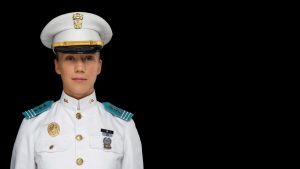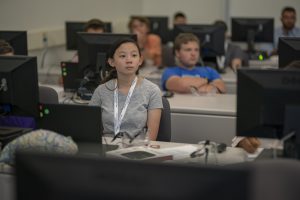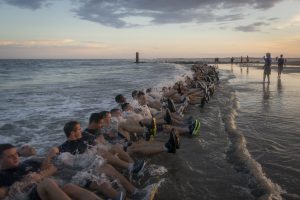Two years ago, I was a second-year graduate student on a quest for a job. A random flyer on a bulletin board led me to the public speaking lab, where the director, Gervais Del Porto, talked to me about a community outreach program recently begun by a group of cadets. I was only looking for a part-time gig, but what I found was an opportunity to help deserving students develop their public speaking skills.
“If you could have dinner with any person—dead or alive—who would it be and why?” The question was asked by a cadet at our mentoring session at Simmons Pinckney Middle School.
The goal of the weekly session was to teach students to speak confidently and express themselves through theater games and bonding with cadets. The cadets sometimes seemed to enjoy the sessions even more than the middle school students, but their enthusiasm was contagious and encouraged the younger students to participate more. We began each visit with mini table topics, which are brief prompts or questions designed to elicit a spontaneous response.
“If I could have dinner with anyone, I would have dinner with my dad because I just want to know what he looks like.”
The speaker was a sixth-grade boy who looked like any other 12-year-old in his worn school uniform—khaki pants, a navy golf shirt and the inevitable scuffed-up sneakers. His words struck a chord for many in the room that day. And there were others whose stories spoke to us too—students who knew about the stark realities of poverty, broken homes and the loss of family members to gun violence. We recognized that the students we were working with had endured hardships unfamiliar to most of the participating cadets, which reinforced in us the need to build meaningful relationships that would help lift them up and propel them forward.
Their favorite activity was Freeze, a game in which two participants improvise a scene. The audience has to figure out who they are, where they are and what they are doing. Often the students depicted scenes from interactions with teachers in the classroom or situations that occurred at home. To decrease fidgeting and improve eye contact, we encouraged them to speak clearly and directly, and we had them focus on a particular object or person in the room. We made sure that they respected the leaders and taught them to see themselves as leaders too. It was heartening to see these young students supporting and encouraging their peers.
In the spring semester, we officially named the group SPEAK UP, and we invited the students to share their own stories. Our theme, based on an acronym, was “What makes you TICK?”:
Tell a story
Introduce yourself
Convey confidence
Know your subject
We gave the students the opportunity to practice the TICK method by developing stories about who they wanted to be when they grew up. At the same time, we gave them opportunities to have fun with different games. When they shared their stories, we discovered we had students who wanted to become hairstylists, entrepreneurs, chefs, basketball players, lawyers and other professionals. Many of them had yet to understand that public speaking is an integral part of being able to achieve their dreams, but we did what we could to help them understand. Often, they were just looking for someone to listen to them without judgment and recognize what they were trying to say. We did our best to answer that call. When they worked in group sessions, I overheard cadets offering encouraging words. That encouragement led to powerful personal stories and funny narratives. The cadets did a phenomenal job of getting even the toughest student to participate and have some fun.
Every Monday, for an hour each week over the last two years, has been unique and offered a different experience—some filled with joy and laughter, others with quiet frustration. Yet each week we returned to show the students we cared and to motivate them to become the best versions of themselves. And while we were helping them, we learned much about ourselves—how gratifying it is to reach out to others and what a meaningful role we can play in the lives of others when we choose to look beyond ourselves.
Every Monday was memorable.
The Patricia McArver Public Speaking Lab was founded by the late Henry Dale Smith,’47. Danielle Rhodes is a graduate student in the school psychology program. A native of Dallas, Texas, she received her Bachelor of Arts degree in Psychology from Clemson University in 2013 and plans to graduate from The Citadel in 2019.

 A Dream Fulfilled
A Dream Fulfilled Cyber in the Summer
Cyber in the Summer Sunset on Folly Beach
Sunset on Folly Beach